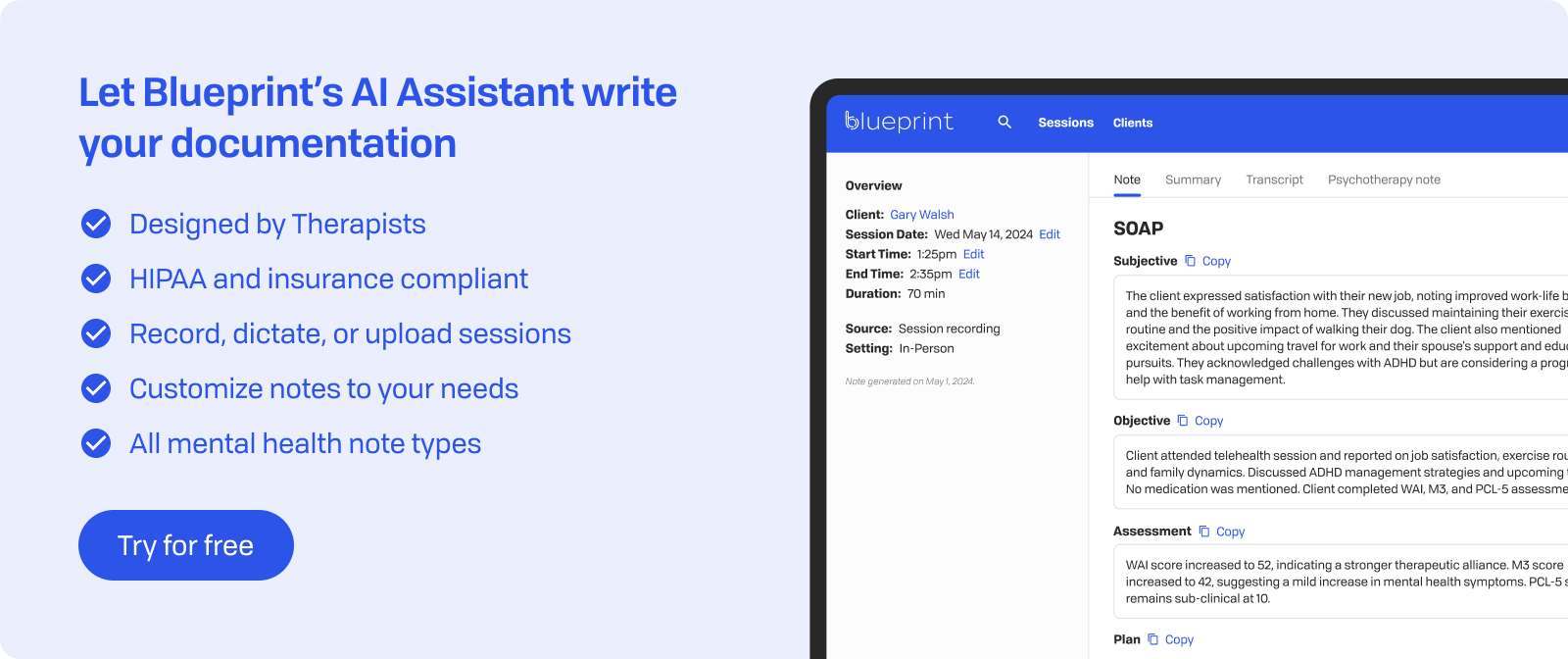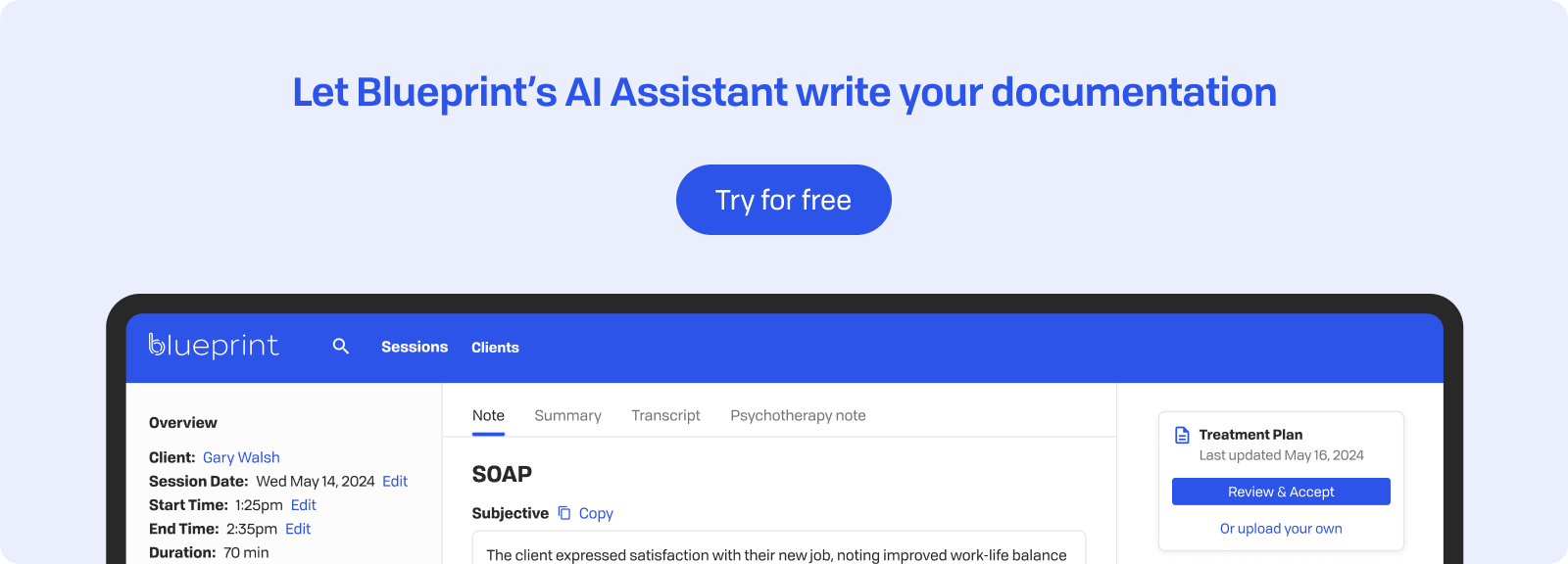
In Brief
You've spent years training, finished hundreds of hours in group and individual supervision, earned your credentials, and helped countless clients make meaningful progress. Yet you still hear that nagging voice saying, "You're not good enough," “Other therapists know what they’re doing but you don’t,” or "They'll figure out you don't know what you're doing." Sound familiar?
Feeling like a fraud, despite clear evidence of your abilities, affects therapists at every career stage. From newly licensed clinicians to seasoned practitioners, this phenomenon can appear when least expected. Ironically, the qualities that make us effective therapists often make us more prone to these feelings.
Knowing why this happens and finding ways to manage it can change not just your practice, but also your relationship with your professional identity. Let's look at what makes therapists particularly vulnerable to these experiences and how to spot when they're affecting you.
Recognizing Imposter Syndrome Among Therapists
Imposter syndrome in therapists often shows up as persistent self-doubt, anxiety that others know what they’re doing more than you, pressure to see clients make great strides right away, or a nagging inner critic. These internal experiences are present even if there is clear evidence of your competence. You might dismiss positive client outcomes as luck or credit progress entirely to the client's efforts. When colleagues praise your insights or refer clients to you, you deflect or downplay their comments.
This self-doubt sticks around even with advanced credentials, years of experience, and consistent client progress. You might think, "If they really knew how uncertain I feel" or "I'm just good at pretending." These thoughts persist regardless of objective measures of success.
Common triggers in therapy practice include client no-shows ("They must not be getting anything out of coming to see me"), moments of silence in sessions ("I should know what to say"), or uncertainty about interventions ("A real therapist would know exactly what to do"). Even normal therapeutic challenges become evidence of inadequacy rather than opportunities for growth.

Why Therapists Are Especially Vulnerable
High empathy and perfectionism lead us to set impossibly high internal standards. We expect ourselves to always know the right thing to say, never make mistakes, and heal every client. These unrealistic standards set us up for inevitable feelings of failure.
The wide range of presentations and diagnoses can feel overwhelming, especially early in practice. One day you treat anxiety, the next complex trauma, then a personality disorder. Or, you believe you have done a full assessment and then a client begins showing signs of an eating disorder or substance misuse. In addition to clinical presentations, each client also brings with them unique lived experiences and cultural and familial backgrounds. Each client requires a personalized approach and the learning curve never truly ends.
Private practice and professional isolation reduce the immediate peer support that can normalize struggles. Without regular case consultation or casual colleague interactions, we lose perspective on what's typical. Small challenges can spiral into major self-doubt without reality checks.
The pressure to be "helpful enough" or "skilled enough" translates into constant anxiety about adequacy. We carry the weight of our clients' well-being, interpreting any lack of progress as personal failure. This responsibility, while part of our professional commitment, can fuel imposter feelings when outcomes don't match our expectations.
Negative Impacts on Clinical Practice and Well-Being
When imposter syndrome takes over, it affects every part of your work and life. The consequences can undermine years of training and natural therapeutic skills.
Clinical confidence fades quickly. You start overthinking every intervention, second-guessing techniques that once felt natural. Instead of trusting your clinical judgment, you might hold back from suggesting helpful interventions, fearing they'll reveal your "incompetence." Sessions become mentally exhausting as you analyze every word and gesture.
Your anxiety becomes noticeable in the therapy room. Clients pick up on subtle cues—the hesitation before speaking, the uncertainty in your voice.. This undermines the core foundation of therapeutic work: a secure, confident presence that helps clients feel safe exploring difficult territory.
The personal toll adds to professional struggles:
- Burnout speeds up: Self-doubt follows you home, disrupting sleep and wearing down the resilience you need for this demanding work.
- Boundaries blur: You over-prepare for sessions, offer extra time, or lose your sense of perspective and either refuse new patients you are qualified to see due to self-doubt or take on challenging cases beyond your comfort zone—all to compensate for perceived inadequacy.
- Job satisfaction drops: What once brought meaning becomes a source of dread.
These impacts create a vicious cycle. Poor boundaries lead to exhaustion, which increases mistakes, further reinforcing imposter feelings. Without intervention, talented therapists may leave the field entirely, convinced they were never suited for this work despite evidence to the contrary.

Common Scenarios That Trigger Imposter Feelings
Certain professional milestones and transitions often lead to imposter feelings, even in experienced therapists. Being aware of these situations can help you understand that the experience is normal and prepare for the self-doubt that often accompanies growth.
First year of practice or gaining licensure brings about the stark realization: "Am I really ready for this?" The shift from supervised trainee to independent practitioner feels significant. You might think that as a licensed therapist, you are now expected to know everything, which is untrue. Without a supervisor's safety net, every decision carries more weight. You might question whether you are adequately prepared for the complexity of real-world practice.
Transitioning to new client populations or treatment modalities can bring back beginner anxieties. Moving from individual therapy to couples work, or from adults to children, means starting over in many ways. Your expertise in one area doesn't automatically transfer, and the learning curve can feel steep. Working with trauma survivors or specialized populations like first responders requires new skills that take time to develop.
Solo work or private practice removes the informal feedback loops of agency work. No more hallway consultations or quick debriefs after difficult sessions. The isolation can distort your perception of normal practice challenges, making every struggle feel like personal failure rather than typical professional growth.
Professional presentations or early meetings create a jarring contrast between internal feelings and external expectations. Colleagues see you as the expert while you feel like you're barely keeping up. Speaking at conferences, leading trainings, or even case presentations can trigger intense imposter feelings as you worry others will discover your "inadequacy."

Strategies to Manage Imposter Syndrome
Tackling imposter syndrome involves taking real steps that counter your internal narrative with external evidence. These strategies work because they focus on shifting from feelings to facts, providing a more balanced view of your professional abilities.
Keep track of your achievements. Start a Wins Journal to note client breakthroughs, positive feedback, and insights from supervision. Include positive feedback from clients, observations of client progress, notes from successful interventions, and times when your clinical intuition was right. Review this evidence regularly, especially during periods of self-doubt.
Use supervision and peer support regularly. Openly discuss your doubts in supervision groups and peer consultations. You’ll find that even experienced colleagues sometimes question themselves. This normalization reduces feelings of isolation and offers reality checks when your perception is off.
Practice self-compassion thoughtfully. When imposter thoughts surface, pause and ask yourself: "What would I tell a supervisee feeling this way?" Consider these thoughts as indicators of growth rather than truth, signaling that you're expanding professionally—a positive sign, not a flaw.
Use data to measure outcomes. Implement feedback-informed treatment tools to track client progress objectively. When you think "I'm not helping," let standardized measures reveal the actual trajectory of change. Data provides a more grounded sense of confidence.
View challenges as opportunities to learn. Consider each difficult case or clinical mistake as valuable information for development. Replace "I should have known better" with "Now I know for next time."
Mistakes as moments of repair. Therapist missteps or ruptures, when addressed transparently and collaboratively, can themselves become therapeutic tools—offering opportunities to model repair and deepen the client’s trust, provided the client is open to the process.
Accept praise without minimizing it. When colleagues compliment your work or clients express gratitude, resist the urge to downplay it. Take three breaths and simply say "thank you," allowing the positive feedback to truly sink in.
Using Imposter Syndrome for Growth
Instead of seeing imposter syndrome as a professional weakness, consider it a tool for development. Those unsettling feelings of self-doubt can actually highlight areas ready for growth, rather than indicating incompetence.
Turn imposter moments into learning opportunities. When self-doubt hits, take a moment to ask yourself: "What specific skill or support would help me feel more confident here?" Maybe you need more training in a particular area, or perhaps it's time to consult on challenging cases. These feelings can guide you toward your next professional development step.
Use transitions as structured learning experiences. Anticipating feelings of being an imposter before workshops, case reviews, or new clinical roles lets you prepare strategically. Create a plan to address your concerns:
- Identify knowledge gaps: What exactly makes you feel unprepared?
- Seek targeted resources: Find trainings, readings, or mentors in those areas
- Practice beforehand: Role-play or rehearse to build confidence
Teaching strengthens your expertise. Presenting at conferences, writing clinical articles, or supervising interns requires you to articulate what you know. This process often shows that your knowledge is stronger than you thought. Each teaching opportunity reinforces your competence while supporting others, turning self-doubt into professional contribution.
The drive to address perceived inadequacy often results in thorough preparation and improved clinical skills. This extra effort, while sometimes tiring, can enhance your therapeutic outcomes and deepen your expertise. The key is recognizing when preparation turns into overcompensation and maintaining healthy boundaries around professional development.

Creating a Supportive Practice Culture
Whether you're in private practice or part of a larger organization, building a culture that acknowledges and addresses therapist imposter syndrome makes a significant difference. These practices transform isolated struggles into shared experiences of growth.
Encourage openness through regular sharing. Dedicate time in team meetings or supervision groups specifically for discussing professional doubts. When senior clinicians share their own imposter experiences, it allows newer therapists to voice their concerns. This openness shifts the narrative from "I'm the only one struggling" to "We all face these challenges."
Integrate supportive rituals into your practice:
- Weekly wins-sharing sessions: Start meetings with each therapist sharing one clinical success, no matter how small.
- Peer reflection groups: Create structured time for therapists to process difficult cases and celebrate growth.
- Mentorship pairs: Match experienced clinicians with newer therapists for regular check-ins beyond formal supervision.
Anchor confidence in objective data. Implement routine use of client progress metrics and outcome measures. When self-doubt creeps in, these tools provide concrete evidence of therapeutic effectiveness. Regular review of aggregated outcomes shows patterns of success that individual perception might miss.
Embrace the learning process. Create expectations that questions, uncertainty, and ongoing education are signs of professional engagement, not inadequacy. Celebrate when team members seek consultation or admit they don't know something, these behaviors model healthy professional development.
The goal isn't to eliminate self-doubt entirely but to create an environment where therapist imposter syndrome becomes a catalyst for connection and growth rather than isolation and shame.
Key Takeaways
Therapist imposter syndrome affects practitioners at all stages, from those newly licensed to seasoned professionals with decades of practice. This widespread feeling doesn’t indicate incompetence but is a common reaction to the unique demands of therapeutic work.
The impact goes beyond personal discomfort, imposter syndrome directly undermines therapeutic effectiveness and clinician well-being. When self-doubt takes over, it can erode the confident presence clients need, increase burnout risk, and even drive talented therapists away from the field.
Practical strategies can significantly reduce these effects:
- Self-awareness practices: Regular reflection through journaling and mindfulness helps identify when imposter thoughts arise
- Data-driven validation: Using outcome measures and client feedback provides objective evidence of effectiveness
- Collegial support: Peer consultation and supervision normalize struggles and offer reality checks
- Cognitive reframing: Challenging negative self-beliefs and adopting a growth mindset turns doubt into learning opportunities
Most importantly, imposter feelings don't have to remain barriers to professional success. With intentional effort, these experiences become valuable indicators of growth areas and catalysts for deeper clinical development. The goal isn't to eliminate self-doubt completely but to recognize it as part of the ongoing journey of professional development.
Remember that experiencing imposter syndrome often signals that you're pushing beyond your comfort zone—a sign of professional engagement, not failure. The very qualities that make you vulnerable to these feelings—high standards, empathy, and commitment to client care—also make you an effective therapist.

How Blueprint can help streamline your workflow
Blueprint is a HIPAA-compliant AI Assistant built with therapists, for the way therapists work. Trusted by over 50,000 clinicians, Blueprint automates progress notes, drafts smart treatment plans, and surfaces actionable insights before, during, and after every client session. That means saving about 5-10 hours each week — so you have more time to focus on what matters most to you.
Try your first five sessions of Blueprint for free. No credit card required, with a 60-day money-back guarantee.























